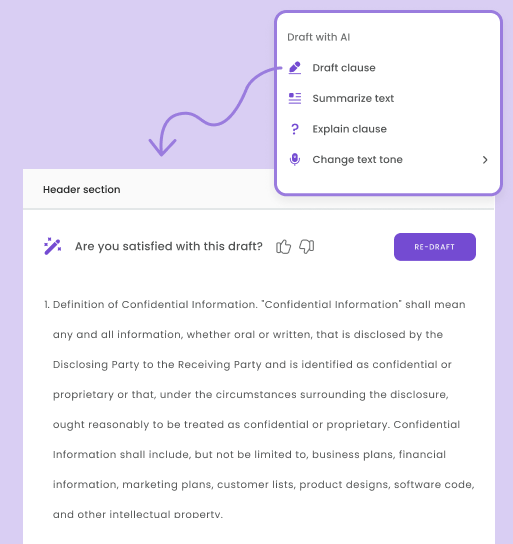There are several cases when someone wants to present evidence or information and do it in a way that’s considered official. That’s where an affidavit comes into play.
There are many types of affidavits and use cases for them.
In this guide, you’ll learn what an affidavit is, the requirements, key components, the major types, and so much more.
Definition of an Affidavit
An affidavit is a written statement made under oath or affirmation, where the individual (known as the affiant) declares certain facts to be true to the best of their knowledge and belief.
An affidavit is used as a tool to present evidence in legal proceedings and is considered a sworn document, meaning that the affiant can be subject to penalties for perjury if the information provided is found to be false.
Legal Basis and Formal Requirements
The legal basis for affidavits varies by jurisdiction, but they generally must adhere to specific formal requirements to be valid.
These requirements include the necessity for the affidavit to be a voluntary declaration of facts made in writing.
The document must be sworn or affirmed before an individual authorized to administer oaths, such as a notary public or a commissioner of oaths.
The process is designed to ensure the authenticity and reliability of the information presented.
Key Components
Key components of an affidavit include:
- Declaration of Facts: The affidavit contains a detailed account of facts that the affiant attests to be true. These facts are outlined and relevant to the matter at hand.
- Written Statement: The affidavit must be in written form, ensuring a permanent record of the affiant’s testimony.
- Oath or Affirmation: The affiant must swear an oath or make an affirmation that the contents of the affidavit are true. This oath or affirmation is made in the presence of an authorized official.
- Signature of the Affiant: The affiant must sign the affidavit to confirm their declaration and commitment to the truthfulness of the stated facts.
- Notarization: The affidavit must be notarized or otherwise legally attested by a notary public or another official authorized to administer oaths. This notarization includes the official’s signature and seal, validating the affiant’s identity and the authenticity of the document.
These components collectively ensure that the affidavit serves as a reliable piece of evidence in legal and administrative proceedings.
Types of Affidavits
The process and requirements for creating affidavits is similar across most jurisdictions. With that being said, there are multiple types of affidavits that serve specific purposes, tailored to the needs of legal and administrative procedures. Here are some common types of affidavits:
General Affidavit
A General Affidavit is a broad category that can be used for various purposes when a specific type of affidavit is not required.
It includes a sworn statement by the affiant regarding any set of facts. This type is often used in personal or business matters to declare information that needs to be documented under oath, such as affirming the truthfulness of a claim or event.
Affidavit of Support
An Affidavit of Support is commonly used in immigration proceedings. It’s a document in which an individual (often a family member or close acquaintance) agrees to financially support an immigrant to prevent them from becoming a public charge.
This affidavit demonstrates that the sponsor has sufficient financial resources to provide for the immigrant and is legally binding.
Affidavit of Identity
An Affidavit of Identity is used to verify a person’s identity. The most common use is when there are discrepancies in personal identification documents, such as name variations, or when an individual needs to prove their identity for legal purposes. This affidavit includes personal details and is usually accompanied by supporting documentation.
Affidavit of Residence
An Affidavit of Residence is used to verify an individual’s address. It’s commonly needed for school enrollment, voting registration, or other legal purposes where proof of residency is necessary.
The affiant declares their current address and sometimes provides additional evidence, such as utility bills or lease agreements.
Affidavit of Heirship
An Affidavit of Heirship is used in probate and estate matters to establish the heirs of a deceased person who died without a will.
This document is typically signed by someone familiar with the decedent’s family history and attests to the relationship of the heirs to the deceased. It’s used as supporting evidence to transfer property and settle the decedent’s estate.
Others
- Financial Affidavit: Used in legal proceedings, particularly in family law cases such as divorce or child support, to disclose an individual’s financial status, including income, expenses, assets, and liabilities.
- Small Estate Affidavit: Utilized in probate proceedings to expedite the process of settling a small estate without formal administration. It allows the heirs to claim the decedent’s assets if the estate meets certain criteria set by state law.
- Affidavit of Service: Used to confirm that a legal document has been properly delivered to a party involved in a legal proceeding. It details the time, date, and manner of service.
- Affidavit of Loss: Used to report the loss of an important document or item, such as a passport, ID card, or financial instrument. It’s often required for the issuance of a replacement.
- Affidavit of Birth: Used to affirm the details of a person’s birth when a birth certificate is unavailable. It’s typically supported by individuals who witnessed the birth or have personal knowledge of the facts.
These affidavits serve critical roles in various legal, financial, and personal matters, providing a formal mechanism to declare facts and ensure accountability through the swearing an oath.
Benefits of Using Affidavits
Affidavits are powerful legal instruments that offer numerous advantages in various contexts, from legal proceedings to administrative processes. Here are some of the key benefits of using affidavits:
Legal Validation of Facts
Affidavits provide a formal mechanism for validating facts under oath. By swearing or affirming the truthfulness of the information contained in an affidavit, the affiant provides a legally recognized statement that can be relied upon in legal and administrative contexts. This validation is crucial in establishing the authenticity and accuracy of the information presented.
Use in Court Proceedings and Legal Matters
Affidavits are widely used in court proceedings and other legal matters as evidence. They allow individuals to present factual information without needing to appear in person, thereby saving time and resources for the court and the parties involved. Affidavits can support motions, applications, and other legal submissions, making them a versatile tool in the judicial process.
Protection Against Perjury
One of the significant benefits of using affidavits is the protection they provide against perjury. Because affidavits are sworn statements made under oath or affirmation, the affiant is legally bound to tell the truth.
If it’s later discovered that the affiant knowingly provided false information, they can be prosecuted for perjury. This legal consequence acts as a deterrent against false statements and ensures the integrity of the information presented.
Simplifies Legal Processes and Documentation
Affidavits simplify legal processes and documentation by providing a standardized method for presenting facts. They reduce the need for extensive verbal testimony and can expedite legal procedures by providing clear, concise, and organized statements. This efficiency benefits not only the legal system but also the individuals involved, as it can lead to quicker resolutions of legal matters.
Enhances Credibility and Reliability of the Information Presented
The formal nature of affidavits, combined with the requirement for notarization or attestation by an authorized official, enhances the credibility and reliability of the information presented.
Courts and other authorities place significant weight on affidavits because they are sworn documents. The affiant’s commitment to truthfulness, reinforced by the legal penalties for perjury, ensures that the information is trustworthy and can be confidently relied upon in decision-making processes.
Legal Implications and Responsibilities
Affidavits carry significant legal weight, and the responsibilities associated with them are critical to maintaining their integrity and reliability.
Understanding the legal implications and responsibilities when creating and using affidavits is essential to ensure its proper use.
Legal Consequences of False Statements
One of the most severe legal implications associated with affidavits is the consequence of making false statements. Because affidavits are sworn documents, lying or providing false information in an affidavit constitutes perjury, a serious criminal offense.
Perjury charges can result in substantial penalties, including fines and imprisonment. The specific penalties vary by jurisdiction but are uniformly designed to deter individuals from providing false information.
This legal consequence underscores the seriousness of affidavits and the importance of truthfulness when using them.
Importance of Honesty and Accuracy
The honesty and accuracy of the information presented in an affidavit is paramount. The purpose of an affidavit is to provide a truthful, sworn statement of facts, and any inaccuracies, whether intentional or not, can lead to significant legal repercussions.
For the affidavit to serve its intended purpose in legal proceedings, administrative processes, or personal matters, it must be a true reflection of the facts as known to the affiant.
Ensuring accuracy also protects the affiant from potential legal actions, including accusations of perjury or fraud, and maintains the integrity of the legal process.
Role of Notaries and Witnesses
Notaries and witnesses play a crucial role in the execution and validation of affidavits. Their responsibilities include:
- Verification of Identity: Notaries and witnesses ensure that the person signing the affidavit is indeed who they claim to be. This is typically done by checking valid identification documents, adding a layer of security and authenticity to the process.
- Administering the Oath or Affirmation: The notary or authorized official administers the oath or affirmation, ensuring that the affiant understands the seriousness of the declaration and the legal implications of providing false information.
- Certifying the Document: Notaries authenticate the affidavit by signing and sealing it, which verifies that the document was properly executed. This certification is essential for the affidavit to be accepted in legal and administrative proceedings.
- Ensuring Voluntariness: Notaries and witnesses ensure that the affidavit is signed voluntarily and without coercion. This protects the affiant’s rights and further supports the document’s validity.
The involvement of notaries and witnesses enhances the credibility and reliability of affidavits, ensuring they can be trusted as accurate and truthful representations of facts.
Conclusion
An affidavit is a serious legal document that can serve many purposes. These include testimony in legal proceedings to recovering lost documents.
There are key components and legal implications associated with affidavits that you should be aware of. This guide has gone through the different aspects of affidavits so you should have a solid grasp of what it is and isn’t.
If you have any questions, let me know in the comments, and don’t forget to share.




